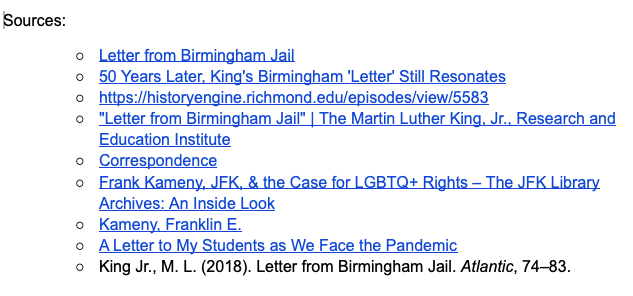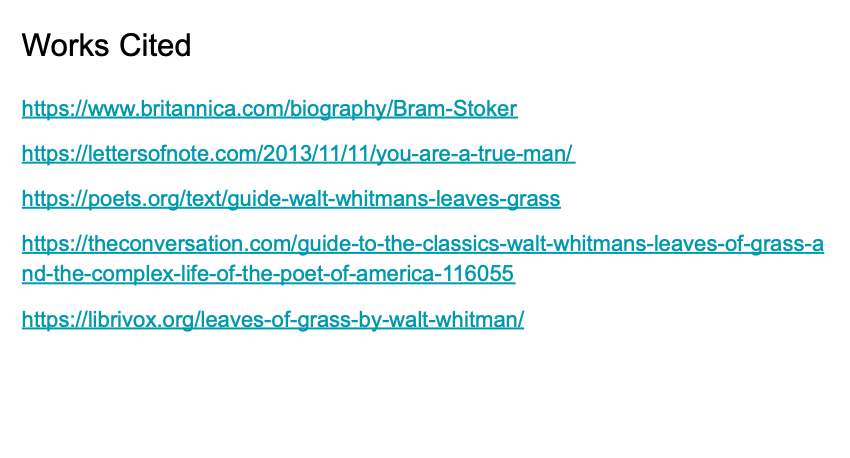Letters have been a persuasive technique to get a point across during time periods when something significant is happening in America. Through looking at letters we can see both the causes and effects they had on the senders and receivers and what, if anything, was done because of them. The language, tone, and word choice used in letters tells the reader the point trying to be made and also the importance of it. The use of writing techniques determine whether or not the letter will be effective and referenced to in the future. Letters have been written for many periods of history both in America and in the world. Some examples of effective and persuasive letters in American history include “Letter from Birmingham Jail” from the civil rights movement in the 1950s and 1960s and letters from Frank Kameny during the gay liberation movement from the 1960s to 1980s. More recently, persuasive letters can be seen in regards to the current global Covid pandemic and the impact it has on us now and in the future.
When trying to understand a letter, it is first important to know why it was written. One letter that stands out from the civil rights movement is “Letter from Birmingham Jail” by Martin Luther King Jr. The letter was written while King was in jail for violating Alabama’s law against mass public demonstrations (“Letter from Birmingham Jail”). The letter was in response to criticism about what he was trying to do and it came from prominent white clergymen. This is a very well known letter both for the time period and in history. “It’s piece full of history but most importantly is a piece where we can witness how Reverend Martin Luther King Jr. approaches his problems and how well it worked.” (“Understanding A Letter From Birmingham Jail”). The letter was effective for many reasons. One of those reasons was because of the language King used.The use of strong language shows how important the issue is to him and could make the letter resonate with or stand out to more people. “Just as the prophets of the eighth century B.C. left their villages and carried their ‘thus saith the Lord’ fay beyond the boundaries of their home towns, and just as Apostle Paul left his village of Tarsus and carried the gospel of Jesus Christ to the far corners of the Greco-Roman world, so am I compelled to carry the gospel of freedom beyond my own home town. Like Paul, I must constantly respond to the Macedonian call for aid.” (King Jr.). Religion has been and is important to many people and using this example could help him to get the support of more people. It could also help people to better understand what he is trying to accomplish. Using another example would not have been as effective because religion is something people can relate to and it’s also something that brings people together, even sometimes different groups of people. “We have waited for more than 340 years for our constitutional and God-given rights. The nations of Asia and Africa are moving with jetlike speed toward gaining political independence, but we still creep at horse-and-buggy pace toward gaining a cup of coffee at a lunch counter. Perhaps it is easy for those who have never felt the stinging darts of segregation to say, ‘wait’” (King Jr.). By comparing the progress that has occured in other countries, he is showing how far America still has to go. He is also saying that this has been a problem for too long and it’s time that something is done. King acknowledges that some people may not feel a lot of concern for this issue because it doesn’t directly affect them but he is showing that it’s a real problem and has been for a while. King goes on to explain what he has seen and what has happened as a Black person in America during this time period. It shows the readers what is really going on in hopes more people become aware of the cause he is fighting for. People of color could also relate to the situations he was describing and know they are supported and heard.
In 1953 President Eisenhower signed an Executive Order that allowed the federal government and military to find, fire, and out people who were suspected of being homosexual (Chandler). One of these people was Frank Kameny. Kameny was an astronomer with the U.S. Army Map Service but people started to think he could be gay and he was fired for immoral conduct. He became an activist for gay rights and sent several letters explaining his argument for gay rights to the Kennedy administration. “In World War II, I willingly fought the Germans, with bullets, in order to preserve and secure my rights, freedoms, and liberties, and those of my fellow citizens. In 1961, it has, ironically, become necessary for me to fight my own government, with words, in order to achieve some of the very same rights, freedoms, and liberties for which I placed my life in jeopardy in 1945.” (Kameny). Kameny points out the contradiction of at one point fighting for his country and then at another point against his country. He tries to show what he and all the other soldiers have done for America and that it would make sense for the government to do something for its people. “The homosexuals in this country are increasingly less willing to tolerate the abuse, repression, and discrimination directed at them, both officially and unofficially, and they are beginning to stand up for their rights and freedoms as citizens no less deserving than other citizens of those rights and freedoms. They are no longer willing to accept their present status as second-class citizens and as second-class human beings; they are neither.” (Kameny). This statement from Kameny feels like an ultimatum or even a threat. It shows how important this issue is to him and the lengths he would go to stick up for his rights and the rights of many others. The use of strong language helps to get his point across. Although he was effective in making change and bringing awareness to the issue, the Executive Order from Eisenhower wasn’t fully formally repealed until January of 2017, six years after Kameny passed away (Chandler). It shows how much time it could take for a change to be made but that it will definitely take longer if no one gets involved or brings the issue to people’s attention.
A more modern example of a persuasive letter from an important time in America comes from the pandemic. There are many examples of letters written about Covid. One example is a letter George Saunders wrote to his students. Saunders is able to use humor and lightness throughout the letter on a very worrisome and stressful topic. “Jeez, what a hard and depressing and scary time. So much suffering and anxiety everywhere. (I saw this bee happily buzzing around a flower yesterday and felt like, Moron! If you only knew!)” (Saunders). While many people don’t use humor to talk about Covid, Saunders does so in a way that people are able to relate to but that doesn’t make fun of what is currently happening. He is describing a feeling that most people can relate to and it helps to see that other people or in this case a lot of people are going through the same thing and are experiencing the same emotions. It’s relatable because we often look back to time before the pandemic and think about how we never would have expected something like this to happen. Saunders also reminds his students of the importance and uniqueness of this time and while it is very unfortunate, it will be important to remember. “…it also occurs to me that this is when the world needs our eyes and ears and minds. This has never happened before here (at least not since 1918). We are (and especially you are) the generation that is going to have to help us make sense of this and recover afterward… Are you keeping records of the e-mails and texts you’re getting, the thoughts you’re having, the way your hearts and minds are reacting to this strange new way of living? It’s all important.” (Saunders). Saunders hopes his students recognize what they are living through and how scary yet valuable this situation is. He realizes and hopes to share the importance of remembering and reflecting on life changing events. It also shows that we can use what we learn now from this experience to help us be better prepared in the future.
Even though these letters are from different time periods, they share some similarities. One of those similarities is they use examples of past events or causes to get a point across and show that the problem they are facing is not necessarily a new issue. Martin Luther King Jr. talks about prophets of the eighth century B.C. and Apostle Paul. Although it isn’t the same issue, Frank Kameny in his letter says “The homosexual in the United States today is in much the same position as was the Negro about 1925.” (Kameny). And in the letter from George Saunders he reminds his students that although these times are unprecedented there was the 1918 pandemic. Using examples of events that have happened in the past can be helpful because it allows people to reflect on what has happened since then and if any changes, good or bad, were made. Another example of a similarity between the letters is that they are now all very public and can be used for various reasons. If these letters were not effective they would not be so well known and often referenced to. They all show what is needed to write an effective letter especially during a significant event or time period. Without these letters we probably would not have had a full understanding of what was happening during that time. They are also helpful for future generations to learn not to repeat the past wrongdoings and hopefully make more positive changes to the country.
Effective letters use language, tone, and word choice to persuade the reader and get a point across about a specific topic. Throughout history and American history it has been seen many times that letters are used to share important information with a variety of people. These letters, especially the ones from the past, and others are important because they show people standing up for what they believe in even when it was not safe to. It also shows even now letter writing is still an important way to communicate. While letter writing isn’t always the quickest, it is able to reach all different kinds of people and places. And being able to access letters online makes it easier and more convenient. We have access to so many letters which allows us to educate ourselves for the better. Although over time the subject matter of the letters has both changed and sometimes stayed the same, the persuasiveness is what makes it have a lasting impact. Looking at letters from history we are able to see the impact for both the writer and readers now and then.

